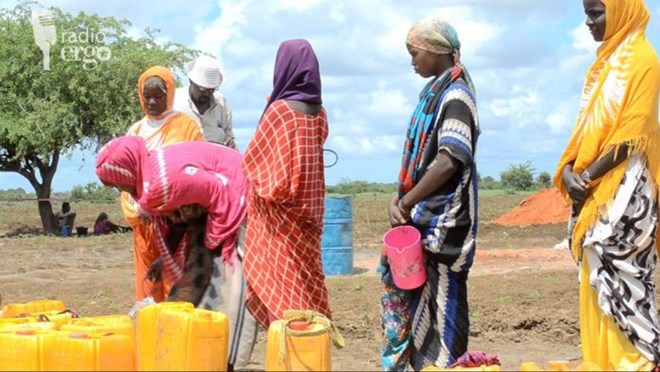
Nadifo Muhyadin Hassan’s family survives on the roughly five litres of water a day that she manages to beg from neighbours.
She asks those who can afford to buy water from the commercial tankers visiting their village of Seemere in central Somalia’s Mudug region to spare a few drops.
“If you have to beg for water you can never get enough. The small amount I get doesn’t last long. If you use it to cook, there’s nothing left,” Nadifo told Radio Ergo.
Sometimes the children cry and I go begging for water to prepare tea but come back with nothing.”
WarsameElmi Omar, chief of Seemere, told Radio Ergo that villagers have been facing water shortages since the borehole pump broke down three weeks ago.
“The borehole was the only one in the village. There is no water, the pump developed mechanical problems and fell inside the borehole. There is no water for both people and livestock,” the chief said.
The village, 37 km west of Jariban, hosts over 1,300 families including pastoralists and small scale traders. The price of water is high.
“One barrel of water costs $15, whilst a water tanker with a capacity of 50 barrels from Jariban town costs $300 because the road is rough at the moment,” Warsame said.
A number of pastoralists have moved away from the village to the town seeking water.
According to the chief, the village authorities contacted Puntland’s water ministry and were told that Puntland State Agency for Water Energy and Natural Resources would replace the pump.
Nadifa has five goats left from the family’s original herd of 100. She makes40 Somali shillings ($1.6) from the sale of the goats’ milk, but fears they will die soon if they don’t get more water.
Meanwhile, in Ba’adweyn village, 200 km from Galkayo, villagers are suffering similarly severe water shortages after the boreholes and reservoirs dried up.
Ali Hassan Farah, a father of nine, struggles to get water for his family and 100 goats. He said the locals have dug the borehole deeper and deeper, trying to access water, but the earth is dry.
“You can’t get enough water for 100 goats. It takes a long time to get any water at all because the boreholes are hand-dug and sand has blocked them up, so we have to remove the sand to get even a very small amount of water out,” said Ali.
Ba’adwayn chief, Ahmed DahirAbdullahi, told Radio Ergo that the water crisis in the village has affected many families, forcing them to flee in search of water elsewhere.
https://www.hiiraan.com/news4/2019/...central_somalia_s_mudug_region_desperate.aspx
A solar powered average borehole pump costs of $1,500. How come a whole state can't dig a water well for it's subjects? Maybe it spent it's meagre resources on the clan militias and the rest has been siphoned by the ministers, deputy ministers and department heads. The problem with clan enclaves.
